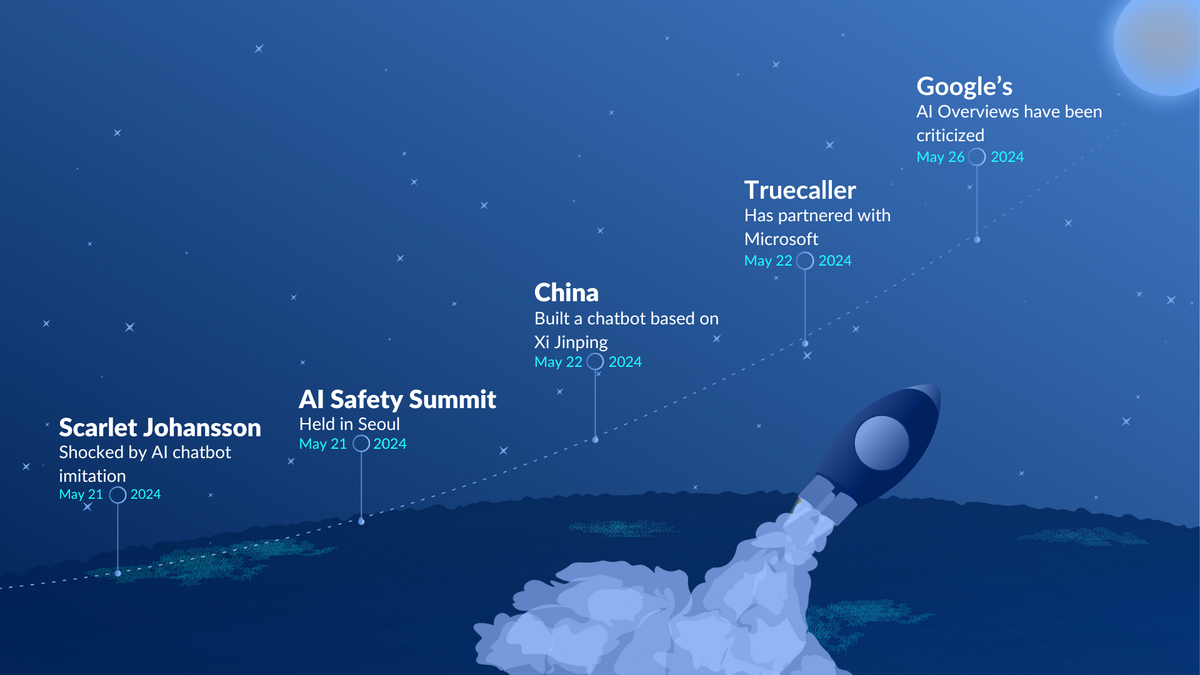Powered by Data - May 27, 2024
Keep up-to-date on conversational AI & chatbots with fascinating data points and weekly news.

Last Week in Conversational AI
- Scarlett Johansson expressed shock and outrage after OpenAI launched a chatbot with a voice similar to hers. Johansson previously declined to voice the chatbot, which reads text aloud to users. Critics noted the resemblance between the chatbot's voice, "Sky," and Johansson's role in the 2013 film Her. OpenAI stated it would remove the voice, denying any intention to imitate Johansson. Johansson accused OpenAI's founder, Sam Altman, of copying her voice. The actress has taken legal action to understand how the voice was created, highlighting concerns about the use of AI in mimicking personal likenesses without consent.
Read More - Truecaller has partnered with Microsoft to integrate Microsoft's Azure AI Speech technology into its AI Assistant. This partnership introduces the Personal Voice feature, allowing users to create a digital version of their voice for use in the Truecaller Assistant. Previously, Truecaller's AI Assistant could answer calls, screen them, take messages, respond on behalf of the user, or record calls. With Personal Voice, users can have their digital assistant sound just like them, enhancing personalization and user comfort. This new feature was showcased at the Microsoft Build conference, highlighting its potential to transform digital interactions with AI-powered voice technology.
Read More - Google's AI Overviews aim to streamline search results by generating summaries directly on the search page, reducing the need for users to sift through multiple web pages. They intend to provide concise answers with links for further exploration. Despite their goal of improving user satisfaction and efficiency, AI Overviews have faced criticism for occasional inaccuracies, such as bizarre suggestions pulled from unreliable sources. Google is actively working to rectify these errors and improve the system. However, there's concern that this feature might reduce the incentive for content creation if users rely solely on AI summaries, potentially undermining the diversity and richness of online information.
Read More - China has developed a chatbot based on Xi Jinping, utilizing more than a dozen books and official documents attributed to the leader. This chatbot was trained on Xi's political philosophy, known as "Xi Jinping Thought on Socialism with Chinese Characteristics for a New Era." It includes extensive state media reports and policy documents. Currently, the chatbot is used at a research center under the Cyberspace Administration of China (CAC) and can answer questions, create reports, and translate languages. This move aligns with China's broader efforts to promote Xi's philosophies. Unlike Western AI models, Chinese AI must adhere to strict regulations, ensuring content embodies core socialist values.
Read More - Global leaders at the AI Safety Summit in Seoul agreed to basic AI safety measures and established an international research network. The summit, hosted by Britain and South Korea, aimed to promote safe and responsible AI development. Key outcomes include a new agreement among 10 countries and the EU to create an AI Safety network similar to the U.K.'s institute. Additionally, 16 AI companies pledged to prioritize safety in their AI development efforts, ensuring transparency and accountability.
Read More
